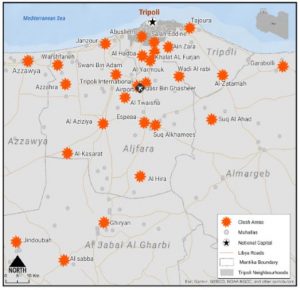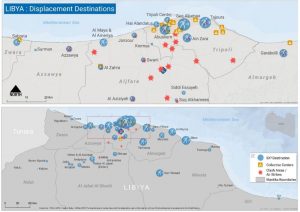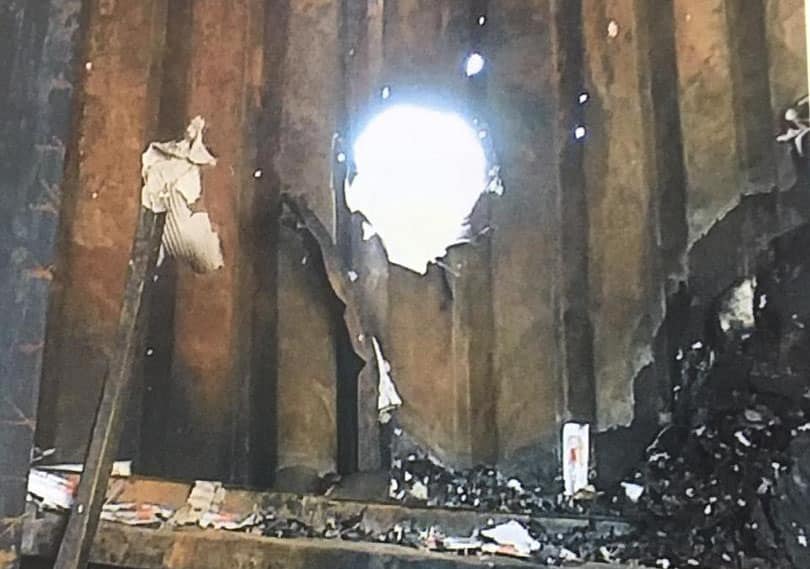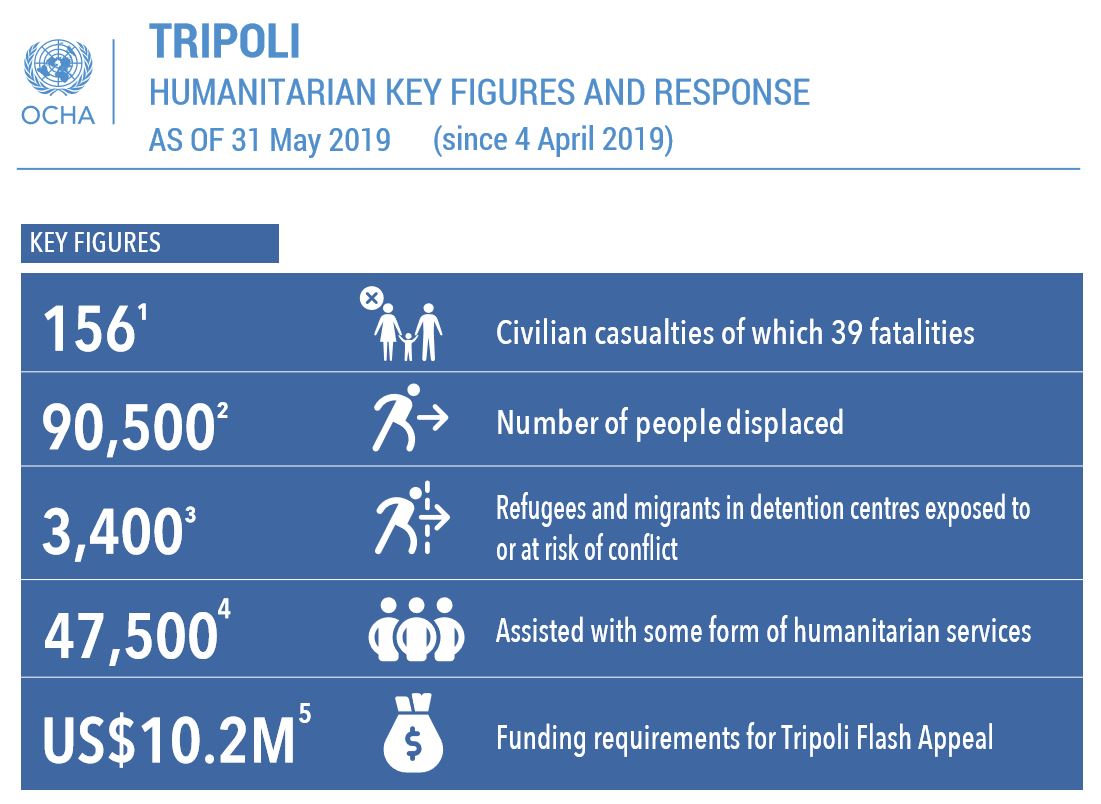By Sami Zaptia.

London, 27 May 2019:
The humanitarian situation continues to deteriorate as a direct result of the armed conflict in and around Tripoli the latest UN Libya Office for the Coordination of Humanitarian Affairs (OCHA) report says. The World Health Organization, meanwhile, reported today that there have been 562 deaths (including 40 civilians) and 2,855 wounded (including 106 civilians) as a result of the greater Tripoli conflict that started on 4 April.
Meanwhile, fifty-odd days on, on the battlefield, the two opposing sides in the Tripoli fighting seem to be stuck in a general stalemate as neither side is able to impose itself on the battlefield. If anything, the Khalifa Hafter aligned forces seem to have lost their momentum having been steadily pushed back from the edges of Ain Zara, Wadi Rabea, Swani and Azizia to beyond the old Tripoli International Airport.
On the humanitarian front, the OCHA report says that health personnel and facilities continue to be impacted by the armed conflict, in violation of International Humanitarian Law (IHL) with two health workers were killed and three others injured on 23 May when two clearly marked armoured ambulance vehicles were struck in the Airport Road area of Tripoli, it adds.
One ambulance was struck, immediately killing a doctor on board and a second ambulance, dispatched to recover casualties from the first attach, was subsequently also struck by shelling, killing one paramedic and injuring two others and a doctor on board.
The report says that to date, 6 health workers have been killed, 7 health workers have been injured, 14 ambulances have been impacted and 2 health facilities have been impacted/evacuated as a result of armed conflict.
These incidents, it explains, further hamper the ability of already overstretched health services to provide vital assistance to civilians, including those injured as a result of armed conflict. It reminds IHL obligates all parties to take constant care to spare civilians and civilian objects, including medical personnel and assets. Deliberate attacks on clearly marked medical transports constitute war crimes under IHL, the report reiterates.
The report says that during the overnight hours of 21-22 May, indiscriminate shelling was reported in a residential area in Tripoli’s Salah Al-Deen district. On the morning of 22 May, indiscriminate shelling was reported in a residential area of Tajura. No civilian casualties were reported as a result of these incidents. The report notes that after peaking in mid/late-April, the instances of random shelling of residential areas (with no ostensible military target nearby) had in recent weeks abated. This has coincided with the increase in precision airstrikes carried out by unmanned aerial vehicles.
Humanitarian agencies, the report added, continue to remind parties of their obligations under international humanitarian law to take all feasible measures to avoid civilian harm, and call on all parties to refrain from using explosive weapons – including by aerial bombardment or shelling – in populated areas, given their likely indiscriminate effect.
The report says that according to latest figures, at least 82,300 individuals have fled their homes (internally displaced – IDP) since the start of the conflict. Of these, approximately half are believed to be children. The rate of displacement has decreased somewhat since the start of the conflict, yet armed conflict continues to drive more and more families from their homes. There are now 47 collective shelters in operation, estimated to house some 800 IDP families (approximately 4,000 individuals), with the majority of IDPs staying in urban areas with family/friends or in rented accommodation, mainly in urban areas of Tripoli.

Many other IDPs have moved to areas along the coastal line of Western Libya and the Nafusa mountains. IDP destinations, including collective shelters, are themselves often close to armed clashes, thus risking secondary displacement and meaning that many IDPs and their host communities remain at risk, the report says.
Humanitarian actors estimate that over 100,000 men, women and children remain in immediate frontline areas, with over 400,000 more in areas directly impacted by clashes (within a one-kilometre radius of the front). Concerns are high for civilians unable to leave these areas, as conditions deteriorate, and emergency services are unable to get through. Water and electricity cuts are being reported from frontline areas, while market access and availability of food is very limited.
Refugees and migrants in urban areas are especially at-risk, as they face discrimination in accessing collective shelters and other services. Humanitarian actors continue to appeal for a humanitarian truce to allow civilians trapped in conflict areas to move freely to safer areas and for assistance to reach those in urgent need.
Humanitarian actors are extremely concerned for the safety and wellbeing of nearly 3,400 refugees and migrants trapped in ten detentions centres (DCs) exposed to, or in close proximity to, the fighting. All individuals inside these centres are at imminent risk, as they have no means of seeking safety on their own. In addition to the risk posed by armed clashes, access to food, water and healthcare is severely restricted at these facilities as a result of the conflict.
Humanitarian actors continue to call for detained refugees and migrants to be released and provided with safe shelter until their asylum claims can be processed or they can be provided with safe repatriation assistance for reunification with their families.
On 20 May, the Humanitarian Coordinator issued a statement condemning the deliberate cut off of water supply to Tripoli and other north-western cities, potentially impacting upwards of 2 million people, by an armed group who stormed a water control station of the Man-Made River Project (MMRP) in Jabal al-Hasawna the previous day.
On 21 May, the water supply to Tripoli was restored. This was the latest in a series of similar incidents in recent years whereby the same armed group has used the threat of cutting off water supply to Tripoli unless authorities meet its demands, which reportedly revolve around the release of an arrested family member of the group’s leader. While not directly related to the Humanitarian actors are also concerned that responsible local authorities are not able to access primary landfill sites in conflict affected areas, leading to a build-up of solid waste in Tripoli. With the summer season approaching this will lead to foul smells and a favourable environment for vector breeding.
A rapid assessment of market access in conflict affected areas in and around Tripoli found that food security varies significantly according to proximity to clashes, with the area of Kallet Al Furjan and Swani Bin Adam municipality being the worst affected locations. Overall, 26 per cent of markets in assessed areas were reported to be closed, while insecurity directly prevented residents from accessing markets in Al Aziziya, Salah Al-Deen, Gaser Ben Ghasheer and Suq Al Khamis.
The report said that prices of fresh vegetables has increased by 20 per cent in Tripoli markets since the start of the conflict, due in part to the fact that agricultural areas to the south of Tripoli have been cut off behind frontlines, while prices for other items such as milk and cooking oil have also increased. Prices of key staples such as bread, rice and couscous have remained stable. The report noted that some of these increases in food prices may be in some part due to increased demand during the fasting month of Ramadan.
The report says that Tripoli port was temporarily closed on 19 May, reopening the following day. Reportedly, it adds, the port was closed due to the arrival of ‘special cargo’. This is a coded confirmation and reference by the OCHA report of the arrival of armoured vehicles at Tripoli port.
During the reporting period, the Libyan National Army (LNA) also announced a ‘total maritime ban’ on ports in the western region although the LNA is not thought to have capacity to enforce such a ban. Disruption of port operations could severely hamper humanitarian response, the report adds.
Humanitarian partners continue to express concern over lengthy delays and inconsistencies in the import and customs clearance of humanitarian cargo entering Libya and call for the fast tracking of aid shipments to ensure timely delivery to affected populations, the report says.
The OCHA report says that the impact of clashes is being felt outside of Tripoli, as more IDPs arrive in other areas and disruptions in humanitarian access and in transportation of essential goods such as food and fuel exacerbate already existing scarcities. Trucks carrying humanitarian assistance targeting populations in areas under LNA control, particularly in the east, continue to be denied permission by GNA-affiliated authorities to move from Tripoli.
The report adds that the lack of cash liquidity is also exacerbating the need of affected populations, especially in the south. The LNA-imposed no-fly zone in the south has interrupted distribution of cash to banks in the south outside of Sebha, impacting the ability of populations already facing scarcities to obtain food and other basic goods.
Areas south of Ain Zara, Khallat Al-Furjan, Aziziya, Wadi Rabea and Gaser Ben Ghasheer remain largely inaccessible to humanitarian actors due to fighting and random shelling. OCHA is supporting humanitarian access through establishment of a new reporting mechanism, whereby humanitarian actors will be able to report access constraints as they transpire to OCHA who will then engage with relevant parties to alleviate, or mitigate the impact of, reported constraints.
Humanitarian partners continue to provide assistance, where access allows. Over 45,600 people have received assistance since the start of the conflict. However insufficient access and funding are impeding response operations, the report says.
The report says that to date, Child Protection partners have reached approximately 5,700 conflict-affected children with PSS/recreational activities and 1,025 conflict-affected children with specialized PSS in collective shelters and in urban areas.
On the political front
On another note, UNSMIL welcomed on Saturday the release of Mohamed Alqarj and Mohamed Al-shaibani, journalists from Libya Al-Ahrar TV, and their safe return to their families in Zintan. It reiterated its calls for all others arbitrarily arrested and detained in Libya to be immediately released.
On Sunday UNSMIL said that it was deeply concerned at a series of serious incidents which had taken place in the last few days in and around Tripoli.
It said that it was very concerned at the report of the kidnapping of a member of the High State Council from the Gaser Ben Ghashir neighbourhood in Tripoli. It also said that it was equally concerned regarding the airstrike on the Rixos compound in Tripoli, a civilian facility located in a high populated area that has been used by members of the House of Representatives for meetings. Shelling civilian targets and the kidnapping of civilians including political actors sends a worryingly anti-democratic message, it added.
On the reported two attacks against ambulances carrying medical staff causing the death of two health workers and injury to others are of serious concern, it reiterated that medical facilities and personnel are strictly protected under IHL and these attacks could constitute war crimes.
It reported that it is working with parties on the ground to acquire the evidence necessary to prosecute all of those proved to have been involved in these violations and all other incidents against the civilian population and civilian infrastructure.
UNSMIL also called again for all those arbitrarily detained and abducted to be immediately released and reminded all parties to the conflict of their obligations under the International Humanitarian Law and the International Human Rights Law.
On the battlefront: The Pro GNA narrative
Meanwhile, on the battlefront, the pro Faiez Serraj Presidency Council and Government of National Accord Volcano of Anger/Rage Operation Room and (pro Tripoli) Libyan Army reported on Saturday that despite fifty-two days since the aggressive attack on the capital by the ‘‘outlaw and war criminals’’, the capital is still holding.
It reported that pro Hafter air force continued on Friday night its ‘‘brutal aggression targeting public institutions and neighbourhoods in the capital Tripoli, after the crime of bombing the Libyan parliament building legislative authority in the country’’.
They claimed that on dawn of the 20th of Ramadan (25 May), their forces managed to ‘‘lure the outlaw forces into a tight ambush, and enabled them to sneak into the Al-Naqlea military base before attacking them from the ground and the air, and teach them a harsh lesson that will be remembered by those who survived’’.
They claimed that their forces destroyed the pro Hafter forces’ ‘‘foreign armoured vehicles and seized a number of the vehicles’’. They added that those under illusions should know that the victors will be those defending their homeland and not those with foreign equipment.
They reported that their Air Force carried out eight combat missions on Saturday, ‘‘targeting armoured vehicles and the fleeing elements from the battlefield’’, which was able to implement ‘‘direct strikes that facilitated the resolution of the battle with a clear victory’’.
On the southern frontline they claimed that their forces continue to patrol the desert and cut off the supply roads of the ‘‘outlaw and war criminal Hafter’’, including the Shwerif area where they combed and ‘‘arrested those involved in the (Hafter) failed coup’’.
If the claims by the pro GNA forces to have some control of the Shwerif intersection are correct, this would be a great gain by them as the road is an important link between the south and central Jufra area. This would be a key intersection for supplies to the Hafter forces either via the south or from the east through Jufra. If they can move northwards towards Gharian they could pincer the LNA forces and isolate them.
Finally, the pro GNA forces concluded by promising the now obligatory: ‘‘Victory is coming soon’’.
The pro LNA narrative
The pro LNA forces continue their minimalist approach to giving out battle details stressing the need for strategic secrecy. However, this week the LNA War Information Division claimed their forces are still in Gharian and had taken control of the Wildlife Open Zoo area off Airport Road.
The LNA claim that their forces are ‘‘progressing at a steady pace in all the axes of fighting in the capital Tripoli and achieving victories’’ and enjoying ‘‘epics of heroism in the battlefields’’.
On Saturday they claimed they were making ‘‘progress has been on all axes, the most important of which is the Tripoli International Airport Road’’ where they inflicted ‘‘many casualties, forcing them to flee and leave their positions. Progress is still ongoing’’, they claimed.
However, what is clear on the ground is that the pro Hafter forces had lost momentum, are bogged down, unable to penetrate the very outskirts of Tripoli. They have failed to hold the disused Tripoli International Airport site and 52 days into the attack on Tripoli, seem to be on the back foot.









